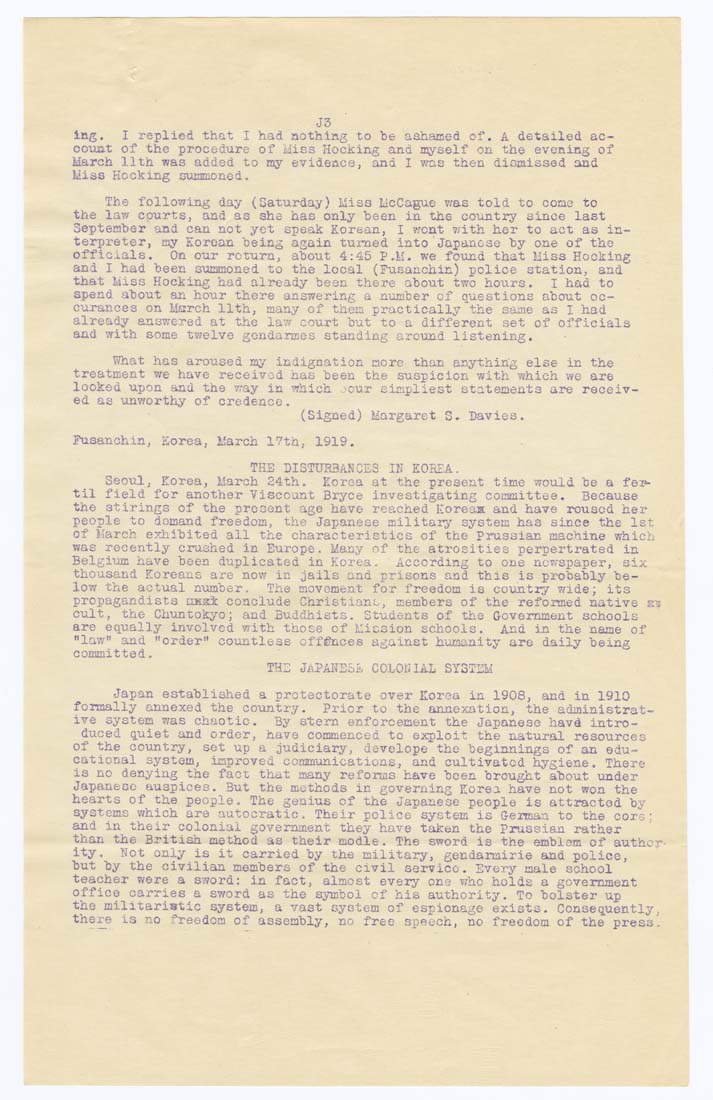J3
ing. I replied that I had nothing to be ashamed of. A detailed ac¬
count of the procedure of Hiss Hocking and myself on the evening of
March 11th was added to my evidence, and I was then dismissed and
iiiss Hocking summoned.
The following day (Saturday) }iisQ ilcCague v/as told to cone to
the law courts, and as she has only been in -the co\intry since last
September and can not yet speak Korean, I v/ont with her to aot as in¬
terpreter, my Korean being again turned into Japanese by one of tho
officials. On our return, about 4:45 P.M. we found that Miss Hocking
and I had been summoned to the local (Fusanchin) police station, and
that Miss Hocking had already been there about two hours. I had to
spend about an hour there answering a number cf questions about oo-
curanoes on March 11th, many of them practically the same as I had
already answered at the law court but to a different set of officials
and with some twelve gendarmes standing around listening.
What has aroused my indignation more than anything else in the
treatment we have received has been the suspicion with which we are
looked upon and the ?/ay in which .)our eimpliest statements are receiv¬
ed as unvforthy of credence.
(Signed) Margaret 3. Davies.
Fusanchin, Korea, March l^th, 1919.
THE DISTUHBANCES IB EOBEA.
Seoul, Eorea, March 24th. Korea at the present time would be a fei^
til field for another ¥iscount Bryce investigating committee. Because
the stirings of the present age have reached Eoreaa and have roused her
people to demand freedom, the Japanese military system has since the Ist
of March exhibited all the characteristics of the Prussian machine which
was recently crushed in Europe. Many of the atrosities perpertrated in
Belgi-um have been duplicated ia Korea. According to oae newspaper, six
thousand Koreans are now in jails and prisons and this is probably be¬
low the actual number. The movement for freedom is country wide; its
propagandists tmsX conclude Christians, members of the reformed native k?
cult, the Chuntokyo; and Buddhists. Students of the Government schools
are equally involved with those of Mission schools. And in the name of
"law" and "order" countless offSnces against humanity are daily being
committed.
THS JAPAIilESi COLOIIIAL SYSTEM
Japan established a protectorate over Eorea in 1908, and in 1910
formally anaexed the country. Prior to the annexation, the administrat¬
ive system was chaotic. By stern enforcement the Japanese havd intro¬
duced quiet and order, have commenced to exploit the natural resources
of the oo\xntry, set up a judiciary, develope the beginnings of an edu¬
cational system, improved communioatioas, aad cultivated hygiene. There
is no denying the fact that many reforms have been brought about under
Japanese auspices. But the mothods in governing Korea have not won the
hearts of the people. The genius of the Japanese people is attracted by
systems which are autocratic. Their polioe system is German to the core;
and in their colonial government they have taken the Prussian rather
than the British method as their modle. The sword is the emblem of author¬
ity. Not only is it carried by the military, gendarmirie and polioe,
but by the civilian members of the civil service. Every male school
teacher were a sword: ia fact, almost every oae who holds a government
office carries a sword as the symbol of hia authority. To bolster up
the militariBtic system, a vast system of espionage exists. Consequently,
there is no freedom of assembly, no free speech, no freedom of the press.
|








